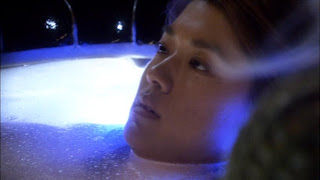
Six guides Baltar through a tough series of torture by Three, in which they try to get information out of him regarding the infection of the basestar in the previous episode. Again, we see the carnal nature of Baltar’s relationship with Six, and, consequently his understanding of theology—mixing theology with raw, physical/sexual pleasure. In a sense, Baltar lives the Song of Songs. While he is being tortured by Three, he escapes into his psyche with Head Six, who guides him in discussing theology and science with Three.
Baltar denies having anything to do with infecting the basestar, that it was all a coincidence. Three believes that coincidences don’t exist, but all things and events are part of God’s grand plan. In his head, Six tells him to be a scientist and “examine [Three’s] faith.” So, Baltar pushes Three while she pushes him in the interrogation process:
Baltar hit a nerve with Three, who we know has had some doubts about her faith, about her God, a nerve that was hit by the oracle Three visited on New Caprica. Baltar tries to distract Three from torturing him by challenging her on her own spiritual journey, challenging her on the meaning she finds in her life. Three, however, doesn’t have any part of his challenges.
In the meantime, while Three sticks a prod in Baltar’s ear, in his psyche, he and Six are consummating their “love.” Head Six tells him to tell her that she should believe in him, believe that he is worth saving. Out loud, in the midst of his screams, Baltar tells Three (and Head Six) “I want you to believe in me. Don’t stop!...You have to believe in me. You’re all I have left.” Three stares at Baltar, confused and moved. Baltar continues speaking to Head Six out loud and says “I love you with all my heart.” Three touches his face and weeps. She has been hurting the one who is offering to help her find her way, help her understand God. In fact, he becomes a Christ-figure in this scene, as he is tortured, he asks her to believe in him, as though he is God, the God he tells her she questions and perhaps doesn’t even believe in anymore.
Baltar denies having anything to do with infecting the basestar, that it was all a coincidence. Three believes that coincidences don’t exist, but all things and events are part of God’s grand plan. In his head, Six tells him to be a scientist and “examine [Three’s] faith.” So, Baltar pushes Three while she pushes him in the interrogation process:
Baltar: I’m a scientist. And as a scientist, I believe that if God exists our knowledge of him is imperfect. Why? Because the stories and myths we have are the products of men. The passage of time. That religion in practice is based on a theory. Impossible to prove. Yet you bestow it with absolutes like, “There is no such thing as coincidence.”
Three: It’s called faith.
Baltar: Absolute belief in God’s will means there’s a reason for everything. Everything! And yet you can’t help ask yourself how God can allow death and destruction and then despise yourself for asking. But the truth is, if we knew God’s will, we’d all be Gods, wouldn’t we? I can see it in your eyes, D’Anna. You’re frustrated. You’re conflicted. Let me help you. Let me help you change. Find a way to reconcile your faith with fact. Find a way towards a rational universe.
Baltar hit a nerve with Three, who we know has had some doubts about her faith, about her God, a nerve that was hit by the oracle Three visited on New Caprica. Baltar tries to distract Three from torturing him by challenging her on her own spiritual journey, challenging her on the meaning she finds in her life. Three, however, doesn’t have any part of his challenges.
In the meantime, while Three sticks a prod in Baltar’s ear, in his psyche, he and Six are consummating their “love.” Head Six tells him to tell her that she should believe in him, believe that he is worth saving. Out loud, in the midst of his screams, Baltar tells Three (and Head Six) “I want you to believe in me. Don’t stop!...You have to believe in me. You’re all I have left.” Three stares at Baltar, confused and moved. Baltar continues speaking to Head Six out loud and says “I love you with all my heart.” Three touches his face and weeps. She has been hurting the one who is offering to help her find her way, help her understand God. In fact, he becomes a Christ-figure in this scene, as he is tortured, he asks her to believe in him, as though he is God, the God he tells her she questions and perhaps doesn’t even believe in anymore.




















